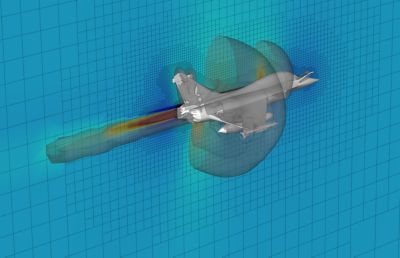-
-
Access Free Student Software
Ansys empowers the next generation of engineers
Students get free access to world-class simulation software.
-
Connect with Ansys Now!
Design your future
Connect with Ansys to explore how simulation can power your next breakthrough.
Countries & Regions
Free Trials
Products & Services
Learn
About
Back
Products & Services
Back
Learn
Ansys empowers the next generation of engineers
Students get free access to world-class simulation software.
Back
About
Design your future
Connect with Ansys to explore how simulation can power your next breakthrough.
Free Trials
ANSYS BLOG
November 22, 2022
Ansys Channel Partners: A Link Around the World
In today’s interconnected world, working in isolation isn’t a sustainable business model. The path to goal completion is dotted with dependencies. No project, no team, no company is an island, and Ansys is no exception.
To deliver its software worldwide, provide the outstanding service customers expect, and help enable transformative innovation, Ansys extends its sales, support and training efforts through a network of nearly 160 channel partners. These independent companies represent Ansys across the globe.

Value Beyond the Sale
For Erke Wang, Managing Director of Ansys Elite channel partner CADFEM GmbH, the function of the channel partner is easy to describe: helping to ensure both customer success and sustainable growth for Ansys through long-term relationships and local market knowledge.
The reality of how that gets accomplished isn’t simple and there are no shortcuts. Channel partners are not transactional vendor-types who walk away after the deal is done.
Instead, like Ansys itself, they do everything they can to optimize the value their customers receive from Ansys products. That means helping with implementation, adoption, customization and workflow integration, as well as providing both startup training and long-term learning.

Iso-surface of the Mach number of a jet, simulated by Ansys Elite Channel Partner Rand Simulation.
For example, Rand Simulation, a division of Rand Worldwide and an Ansys Elite channel partner, designed the Ansys Development & Ongoing Proficiency Training (ADOPT) program. Jason Pfeiffer, Vice President, Rand Simulation, said the program provides continuing education on an annual basis to “strengthen user proficiency and overall Ansys ROI through direct collaboration and mentorship from our team of fluids, structures, and electronics experts.”
Channel partners sometimes go even further, becoming a hands-on, in-house simulation surrogate for small- and medium-sized customers who don’t have simulation specialists on staff.
Strength in Numbers
Besides selling software and creating (and maintaining) happy customers, channel partners provide boots on the ground to help Ansys grow. Because channel partners are well-known organizations with long histories and strong reputations, they can trade on established customer relationships and market credibility to give Ansys a foothold in areas where it would be time-consuming and costly to start from scratch — or where it wouldn’t make strategic sense.
“It’s very hard to have Ansys people everywhere,” says Chokri Guetari, Director Channel Enablement at Ansys. “In fact, in some markets, the channel partner presence is far stronger than our direct presence.”

KOLLIDE NFL helmet, simulated with support from Ansys Elite Channel Partner the SimuTech Group
Channel partners also provide strength in numbers, nearly doubling the Ansys force, according to Guetari. He’s not talking just about the sales team, by the way, but also about “engineers, people with advanced degrees, including Ph.Ds., who understand local requirements and know the pains and pressures their clients face.”
Helping customers overcome today’s challenges is just part of the channel partner workload. They’re also focused on what the future may hold. For CADFEM’s Wang, that means providing Ansys with insight into new technology trends and giving the company a headstart into the features engineers will need in the years to come. It also means developing the next generation of simulation engineers, something CADFEM does through its long-term collaborations with local universities and research institutes.
“We’re helping educate and prepare future simulation engineers to make them available for industry,” Wang says.
According to Guetari, the training Ansys provides for its channel partners is just as forward-looking. It prepares channel partners to sell and support Ansys products effectively across the entire product range.
“We have an ongoing mentoring and development program to help channel partners gain experience with all the products we offer that is very similar in content and quality to what our direct organization goes through,” Guetari explained.
To be sure that the development activities meet all the expected benchmarks, channel partners participate in a certification program that measures performance and provides additional training.
Making the Grade
Most channel partners represent all Ansys products. There are some exceptions, however.
As Ansys has expanded through acquisition and its product portfolio has grown more complicated, some smaller channel partners have found it challenging to cover everything and have become more specialized instead, focusing on their market’s higher-demand products. Among larger channel partners, specialization is common. They typically have staff experts in widely used products such as Ansys Fluent or Ansys Mechanical on board.
Guetari sees specialization as a possible precursor to increased vertical integration.
Ansys is already adding more vertical channel partners who focus on specific technology, he says. Some have been swept in with an acquisition; as Guetari explained, when Ansys purchases a company or software product, there are often channel partners who “come along” with it. No one wants to overlook the level of expertise those channel partners offer. There’s no guarantee from the start, however, that they will become affiliated with Ansys.
“During a transition period after the acquisition, we’ll figure out if the channel partner is a good match, if there’s an alignment,” Guetari says. “If there is, then they become an Ansys partner.”
If that new partner has what Guetari called “the will, intent, and capability” to expand, it’s generally strategic for them to expand to other products as well. But that’s not always the case. Sometimes, the channel partner who excels at one thing continues to do so, with Ansys leveraging their expertise by having them support other partners and the direct team.
As an example, when Ansys acquired structural analysis software LS-DYNA, it also brought in the acknowledged LS-DYNA expert, DYNAmore.

Tidal energy turbine developed by Orbital Marine, supported by Ansys Elite Channel Partner EDRMedeso
Here for the Long Term
Given all of the advantages channel partners offer to Ansys and its customers, it’s no surprise the ecosystem continues to grow.
What’s probably more of a revelation, though, is how long some of Ansys’ channel partner relationships have been going on.
The fact is, Ansys started selling through channel partners from day one. Companies like CADFEM, PADT, and SimuTech have been with Ansys for at least 30 years. Other channel partners, including Ozen Engineering, Tae Sung S&E, Cybernet Systems, Taiwan Auto-Design Company, and LEAP Australia, have a decade or two under their belts.
What’s behind the longevity? What makes being an Ansys channel partner a winning proposition?
Wang says it comes down to a few things: working with the best simulation company, getting guidance to succeed, and shared values.
“We value the opportunity to represent the highly respected Ansys brand, which provides world-class simulation products developed for the global market and executed in the local market by us,” Wang says. “Ansys provides support for us to succeed. Our long-term relationship, built on mutual trust, integrity, and common values, is the foundation for developing and growing our Ansys business.”
In the end, Ansys and their channel partners are all about breaking down silos and building up customer performance. Together, we bring engineers the software they need to connect to other software, interrelate with other teams and, ultimately, intersect with product success.
To learn more about becoming a channel partner, click here.